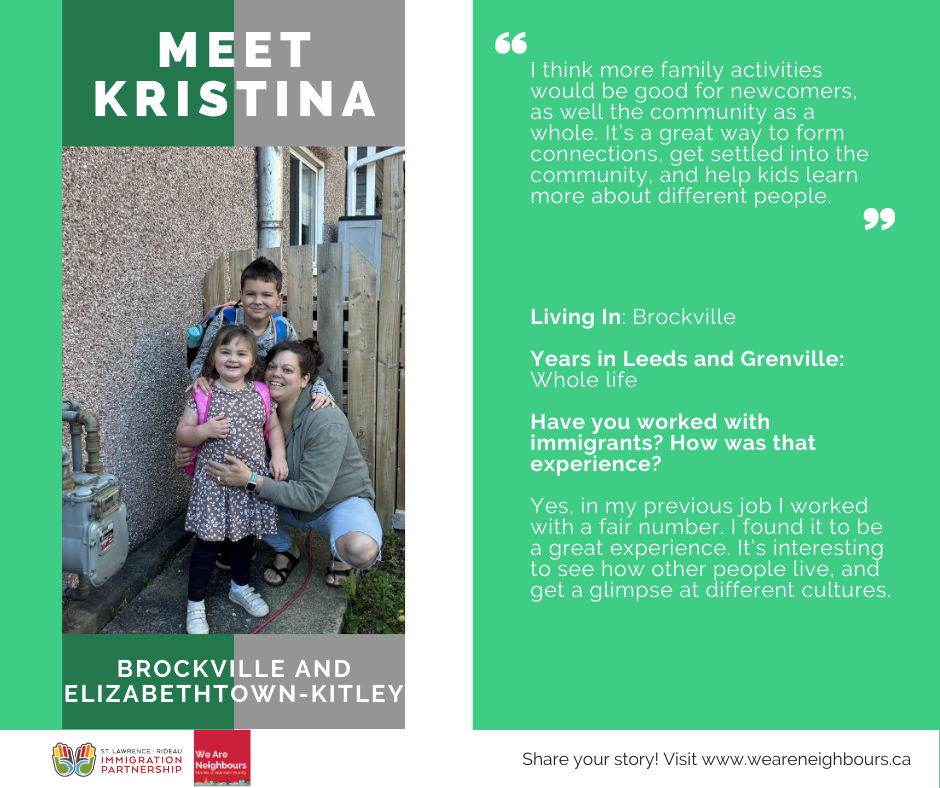Meet Siggy: Coming Together
- weareneighbours
- Aug 21, 2024
- 3 min read
Updated: Jul 23, 2025

1. What brought you to Leeds and Grenville?
I was brought to the area by my family as a child.
2. What are your thoughts on Diversity?
I think Brockville is quickly growing into a robust and diverse community. Diversity can encourage us to challenge our own biases and beliefs. It can also promote the exchange of ideas and insights that are not our own through customs, traditions, and lived experiences. Diversity can be a catalyst for innovation, creativity, and community growth.
3. Have you been satisfied with the health care (physical and mental) in this area? I have noticed some gaps in mental health support specifically that lack of supportive therapy through an Indigenous lens.
4. Have you worked/connected with immigrants? How? And how was that experience?
I work with immigrants often in the Nursing profession. Recently I met a young nurse who is new to the Brockville area. I directed her to the We Are Neighbors Welcoming Committee and the Diversity Advisory Coalition of Leeds & Grenville for potential supports. When I am in the Decolonization and Indigenous Ways Coordinator position at the Brockville Public Library, I create spaces for Indigenous people, non-Indigenous people, and immigrants to attend events such as healing circles, guest speakers, and art workshops. Immigrants are often interested in learning about Indigenous culture while being part of a safe and inclusive community.
5. Are you involved in the community? If so, how?
The Coordinator position at the Brockville library allows me the opportunity to frequently connect with many community members and organizations. I am on a few community committees involved in discussing interventions to improve community supports. I continue to be a member of the Steering committee for the Brockville Municipal Drug Strategy.
6. What groups/organizations/services do you wish were here in this area?
The need for Indigenous supports in this area is increasing as I am told by partnering agencies and organizations. The closest supports can often be in neighboring cities such as, Ottawa, Kingston, and Cornwall. There is a need for Indigenous trauma informed care, more safe spaces to connect with other Indigenous people, education on cultural sensitive and awareness training, education on protocols when working with Indigenous People, land acknowledgments, being an Indigenous ally, and more. Also we need supports for Indigenous people involved in trafficking, abuse, and exploitation within our regions. Additionally we need access to sacred medicines, more cultural supports (learning language, access to elders, etc), discussions on cultural appropriation within the community, awareness of Indigenous social determinants of health and the factors that make Indigenous people more vulnerable than non-indigenous people such as, social stereotypes and stigmas, genetic predispositions, the impacts of inter generational trauma, and more. I think we are also lacking in bringing awareness to the history of Indigenous who have and continue to live in this region.
7. What was the most important thing you found was already here?
There are some passionate and support allies within the community. Many are interested in building bridges with Indigenous people and working towards a more inclusive community.
8. If you could change one thing about this area, what would it be?
The fear of change. In order to grow as a community, we have to be willing to make small changes. This also means that we are inclusive of seniors, youth, immigrants, people with disabilities, vulnerable community members, non-Indigenous people, and Indigenous people when we consider who the changes will impact.
9. What do you think is most important for people to know/think about when working/connecting with Indigenous communities?
It takes time to build trusting relationships with Indigenous people. There is a difference between Indigenous ways of knowing and being, and Western ways of knowing and being. They are two different systems with different expectations, protocols, and understandings.
10. How do you think immigrants and Indigenous communities can best work together/support one another?
Come together at events and gatherings. Immigrants also have unique knowledge systems and ways of being. We can take the time to learn more about each other.
11. How do you think this area could do to better share/promote Indigenous
history/culture/experiences?
Continue to book Indigenous speakers, knowledge keepers, and artists at local events. Remember that Indigenous people have always been here and continue to live here. Include the history of Indigenous people when celebrating the local history. Create save spaces for knowledge sharing and gatherings.




Comments